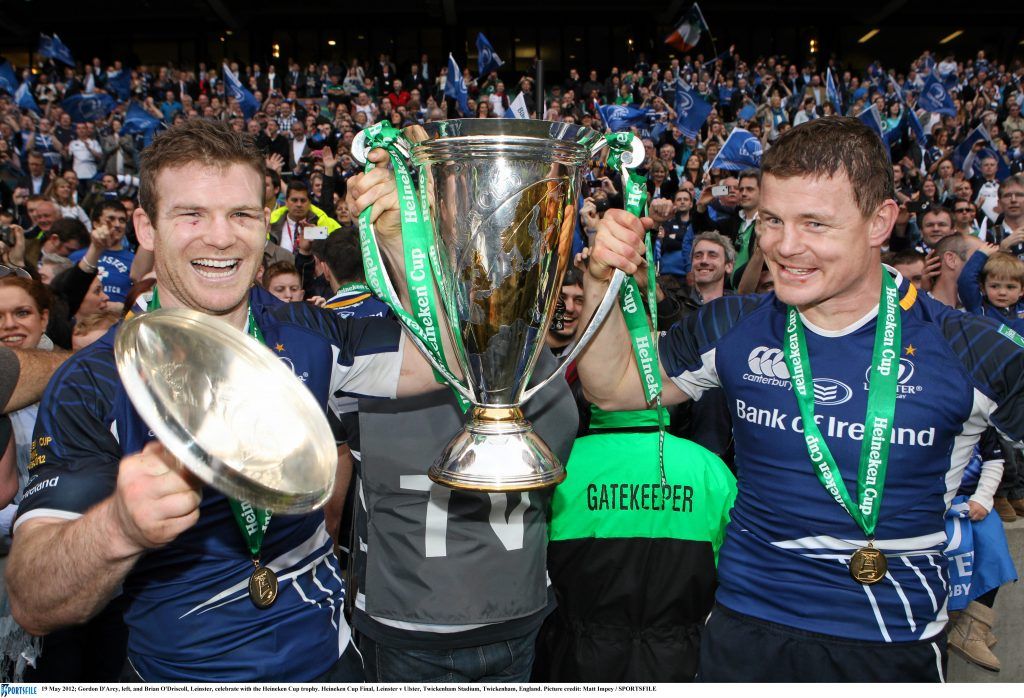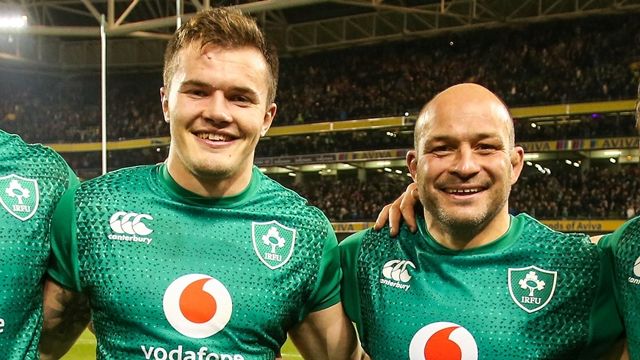‘Ten years is it? Jeez you’re making me feel old’
David Wallace has aged a little since Ireland’s 2009 Grand Slam, we all have, but the memories from that golden era still shine brightly.
The 2009 Grand Slam ended a 61-year wait for Irish Rugby since their last undefeated run in the Five/Six Nations but the 2009 Grand Slam was also the first major piece of silverware that some of the Irish players had won outside of the Triple Crown.
Ireland were successful under Eddie O’Sullivan but there was a change under Declan Kidney and it was a one-off friendly between Munster and New Zealand in Thomond Park that really served as the catalyst for action.
“We had a meeting after the Munster and New Zealand match,” Wallace said at the Virgin Media launch.
“We all watched that and it’s well spoken about how Rob Kearney got up and said that the attitude that we played with our provinces, typified by the New Zealand match, the way they played and the way guys with their provinces were playing, the extra inch that they grow, they were more than the sum of their parts.
“That was missing a little with Ireland so when we came together we weren’t firing as much as would have been provincially. We just addressed that and said we need to do whatever we can to not let that happen.
“When we got that Ireland jersey it had to be something really, really special. Plus there was a lot of talk. Brian O’Driscoll was our captain at the time and he spoke a lot about having played so long and remember this is 2009, Leinster hadn’t won anything at that stage but he had no silverware apart from the triple crowns.
“We had a few of them by that stage, and not that it had been devalued, but we wanted something more. It wasn’t good enough for a player of his standard or the players that we had in that squad.
“That was spoken about a little bit in the media and a little among ourselves. I think it was in the back of our minds but in those meetings it was ‘we need to win silverware’. There was great buildup to the 2007 Rugby World Cup and then we were the great damp squid in it.
“That hurt us and there was still a bit of annoyance over that too but it was a case of this has to be our year. You have to take the chances you’re going to get and we were lucky to be involved. We took it each game at a time and I think we were one or two games into it and I had an interview with Keith Wood and he was working with the BBC at the time.
“He let me know what he was going to ask me and he knew what the answer was going to be so it wasn’t out of the blue but it was basically we’re not looking at Grand Slams, we’re looking at one game at a time, and it’s cliche but it’s cliche because you have to do that.
“In the back of your mind you have to have that because we weren’t going to come out and say it at the time but maybe this year it will be different and they will come out and say we’re the best team in the competition. We’re the best team in the world and our goal has to be to win this Grand Slam and win every game.
“I think certainly their goal has to be to win but whether they win the Grand Slam is another question.”
Ireland’s 2009 team boasted some of the key figures involved in Munster’s 2006 and 2008 European triumphs as well as a core group of Leinster players that would go on to win European Cups in 2009, 2011 and 2012.

There was a talented pool of players at Kidney’s disposal but Irish Rugby did not possess the same level of depth that we now see in Joe Schmidt’s teams and Wallace said that it underlined the value of some of Ireland’s best players and that injury may have cost them a Grand Slam in 2007 when Ireland conceded the championship to France on the final day by just four points.
“There is that bit of a crutch with certain guys, they’re key men, so when you lose a key player – I think it happened with Drico [Brian O’Driscoll] in 2007 where I don’t think he played that France game, maybe Strings [Peter Stringer] as well, there might have been a couple of guys missing, you kind of think well maybe we should have won that game anyway but we may have won it and won it a bit more easily if they had played.
“2007 could have been a Grand Slam year. That was the one where it was the last minute of the game where we were caught out by France from a restart after scoring a penalty.
“That was it, game over, there was a big dependence back then on certain key individuals because there wasn’t the strength and depth that there is now. We have never had it as good as we have now.
“Munster now even have that strength and depth, Connacht have strength and depth with Ultan Dillane coming off the bench and having a big game against Munster. There’s a lot of talented players in Ireland and Leinster have three and four folds of it. That provincial depth is coming through.”
Ireland dropped just one game last year under Joe Schmidt, a first Test defeat to Australia in Brisbane, and there were a number of very impressive facets to their play.
Their forwards were among the most skilled in world rugby. They had the best halves combination in world rugby in Jonathan Sexton and Conor Murray.

They had one wing in Jacob Stockdale who set a Six Nations try scoring record while they had another wing in Keith Earls who won the Irish Players’ Player of the Year award.
They had an abundance of depth in the centres, front-row, second-row, back-row and the back three and they often bullied, bludgeoned and buried teams into submission.
There was a lot to admire about Ireland’s play last year but what impressed Wallace the most was just how clinical they were with their execution.
“They’re so clinical,” added the former Ireland flanker.
“That comes from coaching and the limited, intense time they have with Joe Schmidt. Obviously they have to be doing it with their provinces as well but the fact that they’re able to hold onto the ball and frustrate teams and then they’re clinical as well, not only at the breakdown, but when they have to execute a move they usually back it up.
“You hear stories about something not working in training two or three times but they do it in a match. They switch on and I think that’s one of the things Joe brings to this squad.
“Don’t get me wrong, it’s not all Joe, it’s the players as well, they’re the guys out there, but he puts them under so much pressure on the training paddock that when it comes to a match there’s a bit more shackles off and sometimes it can come off better.
“That’s part of the process but yeah it’s how they’re so clinical and when they run their plays they pull that trigger very, very well and they have the talent, the expertise and the leadership to be able to call the right thing at the right time and everyone trusts each other to do their job.”


















































